Elected President in 1884 and Again in 1892
| | |
| | |
| Term of role | March four, 1861 – April xv, 1865 |
| Preceded by | James Buchanan |
| Succeeded by | Andrew Johnson |
| Date of birth | February 12, 1809 |
| Place of nativity | Hardin Canton, Kentucky (now in LaRue County, Kentucky) |
| Date of expiry | April 15, 1865 |
| Place of death | Washington, D.C. |
| Spouse | Mary Todd Lincoln |
| Political party | Republican |
Abraham Lincoln (February 12, 1809 – April fifteen, 1865), sometimes chosen Abe Lincoln and nicknamed Honest Abe, the Rail Splitter, and the Great Emancipator, was the 16th President of the United States (1861 to 1865), and the kickoff president from the Republican Party.
In the history of the United States, Abraham Lincoln is an iconic figure. He is most famous for his roles in preserving the Union and helping to end slavery in the United States with the Emancipation Proclamation. The son of illiterate farmers, he exemplified the American Dream that in the country of promise and plenty, anyone can ascension to the highest part. He may take battled depression for much of his life. For a human being whose life had its share of tragedy, Lincoln's achievements were remarkable.
Lincoln staunchly opposed the expansion of slavery into federal territories, and his victory in the 1860 presidential election further polarized an already divided nation. Before his inauguration in March of 1861, seven southern slave states seceded from the U.s., forming the Confederate States of America, and took command of U.S. forts and other backdrop inside their boundaries. These events shortly led to the American Civil War.
Lincoln is often praised for his work as a wartime leader who proved adept at balancing competing considerations and at getting rival groups to work together toward a common goal. Lincoln had to negotiate between Radical and Moderate Republican leaders, who were oft far apart on the issues, while attempting to win support from War Democrats and loyalists in the seceding states. He personally directed the war endeavour, which ultimately led the Union forces to victory over the Confederacy.
His leadership qualities were evident in his diplomatic handling of the border slave states at the kickoff of the fighting, in his defeat of a congressional attempt to reorganize his cabinet in 1862, in his many speeches and writings that helped mobilize and inspire the Northward, and in his defusing of the peace issue in the 1864 U.S presidential campaign. Critics vehemently attacked him for violating the Constitution, overstepping the traditional bounds of executive power, refusing to compromise on slavery in the territories, declaring martial constabulary, suspending habeas corpus, ordering the abort of some opposing state authorities officials and a number of publishers, and for being a racist.
Contents
- 1 Early on life
- 2 Early career
- three Marriage
- 4 Towards the Presidency
- 5 Election and early Presidency
- 5.ane Slavery and the Emancipation Declaration
- half dozen Important domestic measures of Lincoln'due south first term
- 7 1864 ballot and 2d Inauguration
- 7.1 Conducting the war endeavour
- seven.ii Homefront
- seven.iii Reconstruction
- 8 Assassination
- 9 Legacy and memorials
- 10 Quotes
- 11 Presidential appointments
- 11.1 Chiffonier
- 11.2 Supreme Court
- 12 Major presidential acts
- xiii States admitted to the Union
- 14 See also
- 15 Notes
- 16 References
- 17 External links
- 18 Credits
All historians concord that Lincoln had a lasting influence on American political values and social institutions. He redefined republicanism, democracy, and the meaning of the nation. He destroyed secessionism and greatly weakened states rights. There are some critics who fence that he prosecuted an unnecessary war. Still, from the bespeak of view of a divine providence that sees the United States as destined to fulfill a primal role in championing freedom and republic throughout the world, Lincoln appears to take been a providential figure. His stirring speeches helped to motivate people through difficult times, the near violent in United states of america history. He dedicated democracy and liberty at a fourth dimension when these ideals were nether threat. For the The states to presume her historic role on the globe stage in the twentieth century, Lincoln'south role in securing national unity in the nineteenth century was essential.
Lincoln'due south assistants established the U.Southward. Department of Agronomics, created the modern organisation of national banks, and encouraged subcontract buying and west expansion with the Homestead Human activity of 1862. During his assistants West Virginia and Nevada were admitted every bit states.
Lincoln is ranked as one of the greatest presidents, due to his role in catastrophe slavery, and his guiding the Union to victory in the American Ceremonious War. His assassination made him a martyr to the cause of liberty for millions of Americans.
Early life
Abraham Lincoln was born on February 12, 1809, in a one-room log cabin in Kentucky, then considered the frontier, to Thomas Lincoln and Nancy Hanks. Lincoln was named subsequently his deceased grandfather, Abraham Lincoln, who had been scalped in 1786 in an Indian raid. He had no middle proper name. Lincoln's parents were uneducated, illiterate farmers. Later on, when Lincoln became more renowned, the poverty and obscurity of his birth were oftentimes exaggerated. In fact, Lincoln'south father Thomas was a respected and relatively affluent denizen of the Kentucky backcountry. His parents belonged to a Baptist church that had pulled away from a larger church because they refused to support slavery. Accordingly, from a very young historic period, Lincoln was exposed to anti-slavery sentiment.
Three years afterwards purchasing the belongings, a prior state claim forced the Lincolns to move. Thomas continued legal action until he lost the case in 1815. In 1811, they moved to a farm on Knob Creek a few miles away. Lincoln's earliest recollections are from this farm. In 1815, another claimant sought to eject the family from that farm. Frustrated with litigation and lack of security provided by Kentucky courts, Thomas decided to move to Indiana, which had been surveyed by the federal government, making land titles more secure. Information technology is possible that these episodes motivated Abraham to later larn surveying and become an attorney.
In 1816, he and his parents moved to Spencer County, Indiana; he would state "partly on account of slavery" and partly considering of economical difficulties in Kentucky. In 1818, Lincoln's mother along with others in the town died of "milk sickness." Nancy Hanks Lincoln was merely 34 years old.
In 1830, after more economical and state title difficulties in Indiana, the family settled on government country in Macon County, Illinois. When his father relocated the family to a nearby site the following year, the 22-year-old Lincoln struck out on his own, boating down to the hamlet of New Salem (Menard County), Illinois. Later that year, he transported appurtenances from New Salem to New Orleans, Louisiana via flatboat. While in that location, he witnessed a slave auction that left an indelible impression on him. Living in a country with a considerable slave presence, he probably saw like atrocities from time to time.
His formal instruction consisted of perhaps eighteen months of schooling from itinerant teachers. In upshot he was self-educated. He mastered the Bible, Shakespeare, English language language and American history, and developed a patently fashion that puzzled audiences more used to flowery oratory. He avoided hunting and line-fishing because he did not like killing animals even for food and, though unusually tall and strong, spent and so much fourth dimension reading that some neighbors thought he wanted to avoid strenuous manual labor. He was skilled with an axe and a good wrestler.
Abraham Lincoln never joined his parents' church building, or any other church building, and every bit a youth ridiculed religion. Yet he read the Bible throughout his life and quoted from information technology extensively in his speeches. A contemporary mentioned that his views on Christian theology were not orthodox. Some historians suggest that he soured on organized Christianity past the excessive emotion and biting sectarian quarrels that marked camp meetings and the ministries of traveling preachers. Yet although Lincoln was not a church member, he did ponder the eternal significance of his circumstances and his deportment.[ane]
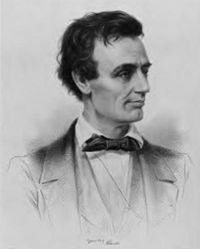
Early career
Lincoln began his political career in 1832 with a campaign for the Illinois Full general Associates every bit a member of the U.S. Whig Party. The centerpiece of his platform was the undertaking of navigational improvements on the Sangamon River to concenter steamboat traffic, which would let the expanse to grow and prosper. He served as a helm in the Illinois militia during the Black Hawk War, although he never saw gainsay. He wrote after being elected past his peers that he had non had "whatsoever such success in life which gave him and so much satisfaction."
He afterward tried and failed at several small-time business ventures. Finally, he taught himself police, and was admitted to the Illinois Bar in 1837. That same year, he moved to Springfield and began to practice police with Stephen T. Logan. He became one of the most highly respected and successful lawyers, growing steadily more prosperous. Lincoln served four successive terms in the Illinois House of Representatives, as a representative from Sangamon County, beginning in 1834. He became a leader of the Whig Party in the legislature. In 1837, he fabricated his first protest against slavery in the Illinois Firm, stating that the establishment was "founded on both injustice and bad policy."[2]
In 1841, Lincoln entered constabulary practice with William Herndon, a fellow Whig. Following Lincoln'due south assassination, Herndon began collecting anecdotes about Lincoln from those who knew him in cardinal Illinois, somewhen publishing a book, Herndon's Lincoln. Lincoln never joined an antislavery society and denied he supported the abolitionists. He married into a prominent slave-owning family from Kentucky, and allowed his children to spend time at that place surrounded by slaves. Several of his in-laws became Amalgamated ground forces officers. He profoundly admired the scientific discipline that flourished in New England, and sent his son Robert Todd Lincoln to elite eastern schools, Phillips Exeter Academy in New Hampshire and Harvard Higher.
Marriage
On November 4, 1842, at the age of 33, Lincoln married Mary Todd. The couple had four sons.
- Robert Todd Lincoln: built-in August 1, 1843, in Springfield, Illinois; died July 26, 1926, in Manchester, Vermont.
- Edward Baker Lincoln: born March ten, 1846, in Springfield, Illinois; died Feb 1, 1850, in Springfield, Illinois.
- William Wallace Lincoln: built-in December 21, 1850, in Springfield, Illinois; died February twenty, 1862, in Washington, D.C.
- Thomas "Tad" Lincoln: born April four, 1853, in Springfield, Illinois; d. July sixteen, 1871, in Chicago, Illinois.
Only Robert survived into adulthood. Of Robert's three children, only Jessie had whatever children (two: Mary Lincoln Beckwith and Robert Todd Lincoln Beckwith). Neither Robert Beckwith nor Mary Beckwith had whatsoever children, and then Abraham Lincoln's bloodline concluded when Robert Beckwith died on December 24, 1985.
Towards the Presidency
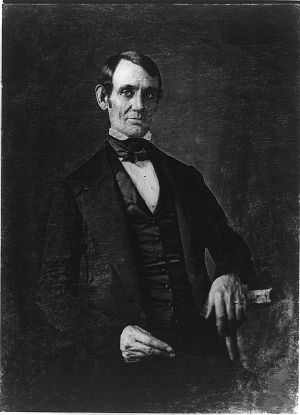
In 1846, Lincoln was elected to one term in the U.Due south. House of Representatives. He aligned himself with the "Whig" party, which meant those who saw themselves as opposing autocratic rule, and in favor of strengthening the function of Congress. A staunch Whig, Lincoln referred to Whig leader Henry Clay as his political idol. Every bit a freshman House member, Lincoln was non a peculiarly powerful or influential figure in Congress. He used his role as an opportunity to speak out against the Mexican-American War.
Lincoln was a cardinal early supporter of Zachary Taylor'due south candidacy for the 1848 Whig Presidential nomination. The incoming Taylor administration offered Lincoln the governorship of remote Oregon Territory. Acceptance would end his career in the fast-growing state of Illinois, so he declined. Returning instead to Springfield Lincoln turned nigh of his energies to making a living equally a lawyer.
By the mid-1850s, Lincoln had acquired prominence in Illinois legal circles, especially through his involvement in litigation involving competing transportation interests—both the river barges and the railroads. In 1849, he received a patent related to buoying vessels.
Lincoln'due south about notable criminal trial came in 1858 when he defended William "Duff" Armstrong, who was on trial for the murder of James Preston Metzker. The instance is famous for when Lincoln used judicial notice, a rare tactic at that time, to show an eyewitness had lied on the stand up, challenge he witnessed the crime in the moonlight. Lincoln produced a Farmer'southward Annual to bear witness that the moon on that date was at such a low angle it could not have produced enough illumination for the would-exist witness to meet anything clearly. Based upon this evidence, Armstrong was acquitted.
The Kansas-Nebraska Act of 1854, which expressly repealed the limits on slavery'south spread that had been function of the Missouri Compromise of 1820, drew Lincoln back into politics. Democrat Stephen A. Douglas, the most powerful man in the Senate, proposed pop sovereignty equally the solution to the slavery impasse, incorporating information technology into the Kansas-Nebraska Human action. Douglas argued that in a republic the people of a territory should determine whether to allow slavery or not, and non have a decision imposed on them past Congress. It was a speech confronting Kansas-Nebraska, on October 16, 1854, in Peoria that caused Lincoln to stand out among the other Gratis Soil orators of the solar day. He helped form the new U.Due south. Republican Party, drawing on remnants of the one-time Whig, Free Soil, Liberty, and Autonomous parties.
In a stirring campaign, the Republicans carried Illinois in 1854, and elected a senator. Lincoln was the obvious choice, but to keep party unity he allowed the election to go to his colleague Lyman Trumbull.
In 1857–1858, Douglas bankrupt with President James Buchanan, leading to a fight for control of the Autonomous Party. Some eastern Republicans fifty-fifty favored the reelection of Douglas in 1858, since he led the opposition to the assistants'due south push button for the Lecompton Constitution which would have admitted Kansas as a slave state. Accepting the Republican nomination for the Senate in 1858, Lincoln delivered a famous spoken language[iii] in which he stated, "A house divided against itself cannot stand. I believe this government cannot endure permanently half slave and half free…. It will get all one thing, or all the other." The speech created a lasting image of the danger of disunion due to slavery, and rallied Republicans across the northward.
The 1858 campaign featured the Lincoln-Douglas debates, a nationally noticed discussion on the issues that threatened to divide the nation in two. Lincoln forced Douglas to propose his Freeport Doctrine, which lost him further back up among slave-holders and speeded the partitioning of the Democratic Political party. Though the Republican legislative candidates won more popular votes, the Democrats won more than seats and the legislature reelected Douglas to the Senate (this was before the Seventeenth Amendment to the U.S. Constitution proscribed pop vote for Senate seats). Nonetheless, Lincoln's eloquence transformed him into a national political star.
Election and early Presidency
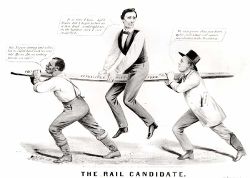
"The Rail Candidate," political drawing, 1860
Lincoln was called as the Republican presidential candidate for the 1860 election for several reasons: because his views on slavery were seen as more moderate; because of his western origins (in contrast to his main rival for the nomination, the New Yorker William H. Seward); and because several other contenders had enemies within the political party. During the campaign, Lincoln was dubbed "The Rail Splitter" past Republicans to emphasize Lincoln'southward humble origins, though in fact Lincoln was quite wealthy at the time due to his successful law do.
On Nov 6, 1860, Lincoln was elected the 16th President of the United States, beating Douglas, John C. Breckenridge, and John C. Bong. Lincoln was the first Republican president. He won entirely on the strength of his back up in the North; he was not even on the ballot in 9 states in the Due south.
Even before Lincoln'due south election, some leaders in the Southward made it clear that their states would exit the Union in response to a Lincoln victory. South Carolina took the lead in Dec, followed by half dozen other Southern states. They seceded earlier Lincoln took part, forming a new nation with the capital letter in Montgomery Alabama, a flag and seal, and a Congress of the Confederate States of America. President Buchanan and president-elect Lincoln refused to recognize the Confederacy.
At Lincoln's inauguration on March 4, 1861, a sizable garrison of federal troops was present, prepare to protect the president and the capital letter from Confederate invasion.
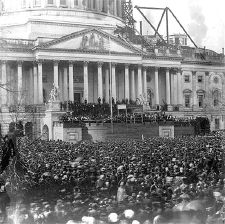
Photograph showing March 4, 1861 inauguration of Abraham Lincoln in front of U.S. Capitol
In his First Inaugural Address, Lincoln declared, "I concur that in contemplation of universal law and of the Constitution the Union of these States is perpetual. Perpetuity is implied, if non expressed, in the fundamental law of all national governments," arguing further that the purpose of the U.South. Constitution was "to form a more perfect union" than the Articles of Confederation, which were explicitly perpetual, and thus the Constitution as well was perpetual. He asked rhetorically that even were the Constitution construed as a elementary contract, would information technology non crave the agreement of all parties to rescind information technology?
Also in his inaugural accost, in a final attempt to unite the Union and prevent the looming state of war, Lincoln supported the proposed Corwin Amendment to the Constitution, of which he had been a driving strength. Information technology would have explicitly protected slavery in those states in which it already existed, and had already passed both houses.
Because opposition to slavery expansion was the primal issue uniting the Republican Party at the time, Lincoln is sometimes criticized for putting politics ahead of the national interest in refusing any compromise assuasive the expansion of slavery. Supporters of Lincoln, yet, bespeak out that he did not oppose slavery because he was a Republican, but became a Republican because of his opposition to the expansion of slavery, that he opposed several other Republicans who were in favor of compromise, and that he clearly thought his course of activity was in the national interest.
Later on U.S. troops at Fort Sumter were fired on and forced to give up in April, Lincoln called on governors of every country to ship 75,000 troops to recapture forts, protect the upper-case letter, and "preserve the Union," which in his view still existed intact despite the actions of the seceding states. Virginia, which had repeatedly warned Lincoln it would not allow an invasion of its territory or join an attack on another land, now seceded, forth with North Carolina, Tennessee, and Arkansas. The slave states of Missouri, Kentucky, Maryland, and Delaware did not secede, and Lincoln urgently negotiated with their leaders, promising not to interfere with slavery in loyal states. Reportedly Lincoln commented, "I hope to have God on my side, only I must have Kentucky."
Slavery and the Emancipation Proclamation
Lincoln is well known for catastrophe slavery in the United States and he personally opposed slavery as a profound moral evil, not in accord with the principle of equality asserted in the Proclamation of Independence. Yet, Lincoln's views of the role of the federal government on the discipline of slavery are more complicated. He had campaigned against the expansion of slavery into the territories; however, he maintained that the federal government could not constitutionally bar slavery in states where it already existed. As president, Lincoln fabricated it clear that the North was fighting the war to preserve the Union, not to cancel slavery. On August 22, 1862, a few weeks before signing the Emancipation Announcement, Lincoln responded by alphabetic character to an editorial by Horace Greeley of the New York Tribune, which had urged abolitionism:
My paramount object in this struggle is to relieve the Union, and is not either to salvage or to destroy slavery. If I could save the Union without freeing whatsoever slave I would exercise information technology, and if I could save it by freeing all the slaves I would do it; and if I could save it by freeing some and leaving others lone I would also practice that. What I practice about slavery, and the colored race, I do because I believe information technology helps to save the Wedlock; and what I forbear, I forbear because I exercise not believe it would aid to salvage the Union.[4]
With the Emancipation Declaration issued in two parts on September 22, 1862, and January 1, 1863, Lincoln fabricated the abolition of slavery a goal of the state of war.[five] [6]
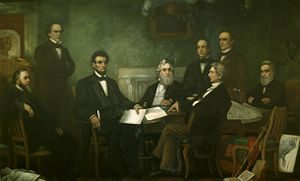
Lincoln met with his Cabinet for the beginning reading of the Emancipation Announcement typhoon on July 22, 1862.
Lincoln is often credited with freeing enslaved African Americans with the Emancipation Proclamation. All the same, territories and states that still allowed slavery only were nether Union control were exempt from the emancipation. The announcement on its first day, January i, 1863, freed only a few escaped slaves, but every bit Union armies avant-garde, more than and more slaves were liberated. Lincoln signed the declaration equally a wartime measure out, insisting that but the war gave ramble power to the president to complimentary slaves in states where information technology already existed. He did not enquire or receive approval of Congress for the declaration. He later said: "I never, in my life, felt more than certain that I was doing correct, than I practice in signing this paper." The proclamation fabricated abolishing slavery in the insubordinate states an official war goal and information technology became the impetus for the enactment of the Thirteenth Subpoena, which abolished slavery. Politically, the Emancipation Declaration did much to help the Northern cause; Lincoln'south strong abolitionist stand up finally convinced the United Kingdom and other foreign countries that they could not support the Confederate States.
Of import domestic measures of Lincoln's first term
Lincoln believed in the Whig theory of the presidency, which left Congress to write the laws. He signed them, vetoing only bills that threatened his state of war powers. Thus he signed the Homestead Act in 1862, making available millions of acres of government-held state in the Due west for purchase at very low cost. The Morrill Land-Grant Colleges Human activity likewise signed in 1862, provided government grants for agricultural universities in each state. The most of import legislation involved coin matters, including the kickoff income revenue enhancement and higher tariffs. Near important was the creation of the system of national banks by the National Banking Acts of 1863, 1864 and 1865. They allowed the cosmos of a stiff national financial organization.
1864 election and Second Inauguration
After Wedlock victories at the Battles of Gettysburg, Vicksburg, and Chattanooga in 1863, many in the N believed that victory was shortly to come up later on Lincoln appointed Ulysses Due south. Grant general in master on March 12, 1864. Although no president since Andrew Jackson had been elected to a second term (and none since Van Buren had been re-nominated), Lincoln'south re-election was considered a certainty.
However, when the spring campaigns all turned into bloody stalemates, Northern morale dipped and Lincoln seemed less likely to be re-nominated. U.S. Treasury Secretary Salmon P. Chase strongly desired the Republican nomination and was working difficult to win information technology, while John Fremont was nominated past a break-off group of radical Republicans, potentially taking away crucial votes in the Nov elections.
The Democratic Party, hoping to exploit the latest news from the state of war in their platform, waited until late summer to nominate a candidate. Their platform was heavily influenced past the Copperhead-Peace wing of the party, calling the state of war a "failure," but their candidate, Gen. George McClellan, was a War Democrat, determined to persecute the war until the Union was restored, although willing to compromise on all other issues, including slavery.
McClellan's candidacy was practically stillborn, as on September 1, just 2 days later the 1864 Democratic Convention, Atlanta was abased past the Confederate army. Coming on the heels of Farragut's capture of Mobile Bay and Sheridan's crushing victory over Gen. Early'southward army at Cedar Creek, it was at present apparent that the state of war was drawing to a close, and the Democratic platform was incorrect.
Yet, Lincoln believed that he would win the U.S. Electoral Higher vote past only a slim margin, failing to give him the mandate he'd need if he was to button his lenient reconstruction plan. To his surprise, Lincoln ended up winning all but two states, capturing 212 of 233 electoral votes.
Later on Lincoln'southward election, on March four, 1865, he delivered his second countdown address, which was his favorite speech. At this time, a victory over the rebels was within sight, slavery had effectively ended, and Lincoln was looking to the future.
Fondly do we promise—fervently do nosotros pray—that this mighty scourge of state of war may chop-chop laissez passer abroad. Yet, if God wills that information technology go along, until all the wealth piled by the bond-human being'due south two hundred and fifty years of unrequited toil shall be sunk, and until every drop of blood drawn with the lash, shall exist paid by another drawn with the sword, every bit was said iii thousand years agone, and so still it must be said "the judgments of the Lord, are truthful and righteous altogether.
With malice toward none; with charity for all; with firmness in the right, as God gives u.s.a. to see the right, let us strive on to finish the work we are in; to bind up the nation'southward wounds; to care for him who shall have borne the battle, and for his widow, and his orphan—to practice all which may achieve and cherish a but and lasting peace, amid ourselves, and with all nations.
Conducting the war endeavour
The state of war was a source of abiding frustration for the president, and information technology occupied virtually all of his time. In Apr 1861, Lincoln had offered control of the army to Col. Robert E. Lee, then considered the best military machine commander. But Lee turned information technology down and threw his military future into his native state of Virginia. Lincoln had a contentious human relationship with Gen. George B. McClellan, who became full general in chief in the wake of the embarrassing Wedlock defeat at the First Battle of Bull Run (Manassas) in July. After the boxing, Lincoln alleged a National Twenty-four hour period of Prayer and Fasting, proclaiming
Information technology is fit and becoming…to acknowledge and revere the Supreme Authorities of God; to bow in humble submission to His chastisement; to confess and deplore their sins and transgressions…and to pray, with all fervency and contrition, for the pardon of their by offenses, and for a blessing upon their present and prospective action.
Lincoln wished to take an active function in planning the war strategy despite his inexperience in armed services affairs. Lincoln'due south strategic priorities were twofold: first, to ensure that Washington, D.C., was well-defended; and 2d, to behave an aggressive war effort in hopes of ending the war speedily and appeasing the Northern public and press, who pushed for an offensive war. McClellan, a West Bespeak graduate and railroad executive called back to war machine service, took a more cautious approach. He took several months to plan and execute his Peninsula Campaign, which involved capturing Richmond, Virginia past moving the Ground forces of the Potomac by boat to the Virginia peninsula between the James and York rivers. McClellan's delay irritated Lincoln, as did McClellan'southward insistence that no troops were needed to defend Washington, D.C. Lincoln insisted on property some of McClellan's troops to defend the majuscule, a decision McClellan blamed for the ultimate failure of his Peninsula Campaign.
McClellan, a lifelong Democrat, was relieved after releasing his "Harrison's Landing Letter," where he offered unsolicited political advice to Lincoln urging caution. His letter incensed Radical Republicans, who successfully pressured Lincoln to engage young man Republican John Pope as head of the regular army. Pope complied with Lincoln's strategic desire to move towards Richmond from the northward, thus guarding Washington, D.C. Nevertheless, Pope was soundly defeated at the Second Battle of Balderdash Run (Manassas) during the summer of 1862, forcing the Army of the Potomac back into the defenses of Washington for a 2d time, leading to Pope's being sent west to fight against the American Indians. After this defeat, Lincoln wrote his "Meditation on the Divine Will":
The volition of God prevails. In corking contests each political party claims to act in accordance with the volition of God. Both may be, and one must be incorrect. God can not be for and confronting the same affair at the same fourth dimension. In the present civil war information technology is quite possible that God'southward purpose is something different from the purpose of either political party.
Panicked by Confederate General Lee's invasion of Maryland, Lincoln restored McClellan to command in time for the Boxing of Antietam in September 1862. It was this Union victory that allowed Lincoln to release his Emancipation Proclamation. Lincoln again relieved McClellan of command when the full general did non destroy Lee'due south army and appointed Republican Ambrose Burnside, who promised an aggressive offensive confronting Lee and Richmond. After Burnside was embarrassingly routed at Fredericksburg, Joseph Hooker assumed control, merely was defeated at Chancellorsville in May 1863, and was relieved of command.
In June and July 1863, as General Lee led his forces into Maryland and Pennsylvania, Lincoln confided to a wounded general,
"When everyone seemed panic-stricken, I went to my room and got down on my knees before Almighty God and prayed. Presently a sweetness comfort crept into my soul that God Almighty had taken the whole business into His ain hands."
After the Spousal relationship victory at Gettysburg and months of inactivity for the Army of the Potomac, Lincoln made the fateful determination to appoint a new regular army commander: General Ulysses S. Grant, who disfavored by Republican hardliners because he had been a Democrat, had a solid string of victories in the Western Theater, including the Battle of Vicksburg. Earlier, reacting to criticism of Grant, Lincoln was quoted as saying, "I cannot spare this man. He fights." Grant waged his bloody Overland Entrada in 1864, using a strategy of a war of compunction, characterized past high Union losses, just past proportionately higher losses in the Confederate army. Grant's ambitious campaign would eventually bottle upward Lee in the Siege of Petersburg and result in the Union taking Richmond and bringing the war to a close in the bound of 1865.
Lincoln authorized Grant to employ a scorched earth arroyo to destroy the Southward's morale and economic power to go on the war. This allowed Generals William Tecumseh Sherman and Philip Sheridan to destroy factories, farms, and cities in the Shenandoah Valley, Georgia, and South Carolina. The impairment in Sherman's March to the Sea through Georgia totaled in backlog of $100 million.
Lincoln had a star-crossed record as a armed services leader, possessing a cracking understanding of strategic points (such every bit the Mississippi River and the fortress urban center of Vicksburg) and the importance of defeating the enemy's ground forces, rather than simply capturing cities. All the same, he had piddling success to motivate his generals to adopt his strategies. Somewhen, he establish in Grant a man who shared his vision of the war and was able to bring that vision to reality.
Homefront
Lincoln was more than successful in giving the war meaning to Northern civilians through his oratorical skills. Despite his meager pedagogy and "weald" upbringing, Lincoln possessed an extraordinary command of the English language, as evidenced by the Gettysburg Address, a spoken language dedicating a cemetery of Union soldiers from the Battle of Gettysburg in 1863. While the featured speaker, orator Edward Everett, spoke for ii hours, Lincoln's few choice words resonated beyond the nation and beyond history, defying Lincoln'southward ain prediction that "the world volition little notation, nor long think what we say here." Lincoln's second countdown address is besides greatly admired and oftentimes quoted. In these speeches, Lincoln articulated better than any of his contemporaries the rationale behind the Union effort.
During the American Civil State of war, Lincoln exercised powers no previous president had wielded; he proclaimed a blockade, suspended the writ of habeas corpus, spent coin without congressional authorization, and frequently imprisoned defendant Southern spies and sympathizers without trial. Some scholars have argued that Lincoln'southward political arrests extended to the highest levels of the regime, including an attempted warrant for Chief Justice Roger Brooke Taney, though the allegation remains unresolved and controversial.
Lincoln faced a presidential ballot in 1864 during the Civil State of war, running under the Union Political party imprint, composed of State of war Democrats and Republicans. General Grant was facing astringent criticism for his conduct of the bloody Overland Campaign that summer and the seemingly countless Siege of Petersburg. Nonetheless, the Union capture of the key railroad center of Atlanta by Sherman's forces in September inverse the situation dramatically and Lincoln was reelected.
Reconstruction
The reconstruction of the Union weighed heavy on the President'southward mind throughout the state of war effort. He was determined to take a course that would not permanently alienate the former Amalgamated states, and throughout the war Lincoln urged speedy elections nether generous terms in areas backside Spousal relationship lines. This irritated congressional Republicans, who urged a more stringent Reconstruction policy. One of Lincoln's few vetoes during his term was of the Wade-Davis Bill, an effort by congressional Republicans to impose harsher Reconstruction terms on the Confederate areas. Republicans in Congress retaliated past refusing to seat representatives elected from Louisiana, Arkansas, and Tennessee nether Lincoln's generous terms.
"Let 'em upward easy," he told his assembled military machine leaders General Grant (a future president), General Sherman, and Admiral Porter in an 1865 meeting on the steamer River Queen. When Richmond the Confederate capital, was at long last captured, Lincoln went there to brand a public gesture of sitting at Jefferson Davis'south own desk, symbolically proverb to the nation that the U.S. President held authority over the entire state. He was greeted as a acquisition hero by freed slaves, whose sentiments were epitomized by one admirer'south quote, "I know I am free for I take seen the face of Father Abraham and have felt him."
Assassination
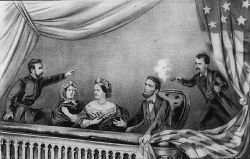
The bump-off of Abraham Lincoln. From left to right: Henry Rathbone, Clara Harris, Mary Todd Lincoln, Lincoln, and Booth.
Lincoln had met frequently with Grant equally the war drew to a close. The two men planned matters of reconstruction, and it was evident to all that they held each other in high regard. During their last meeting, on Apr 14, 1865 (Good Friday), Lincoln invited Grant to a social engagement that evening. He declined. The President's eldest son, Robert, as well turned down the invitation.
John Wilkes Booth, a well-known actor and Southern sympathizer from Maryland, heard that the president and Mrs. Lincoln, forth with the Grants, would exist attending a performance at Ford'southward Theatre. Having failed in a plot to kidnap Lincoln earlier, Booth informed his co-conspirators of his intention to kill Lincoln. Others were assigned to assassinate Vice-President Andrew Johnson and Secretary of State William Seward.
Without his bodyguard Ward Hill Lamon, to whom he related his dream of his own assassination, the Lincolns left to attend the play, Our American Cousin, a British musical comedy. As Lincoln sat in his state box in the balustrade, Booth crept upwards behind the box and waited for the funniest line of the play, hoping the laughter would cover the gunshot noise. When the laughter came, Booth jumped into the box and aimed a unmarried-shot, .44-caliber Derringer at Lincoln'southward head, firing at signal-blank range. The bullet entered behind Lincoln's left ear and lodged behind his right eyeball. Booth then shouted "Sic semper tyrannis!" (Latin: "Thus always to tyrants," and Virginia's country motto) and jumped from the balcony to the stage below, breaking his leg. Booth managed to limp to his horse and brand his escape.
The mortally wounded and paralyzed president was taken to a house beyond the street, now called the Petersen House, where he lay in a coma. Lincoln was officially pronounced expressionless at 7:22 A.M. the adjacent morning, April 15, 1865. Upon seeing him die, Secretary of State of war Edwin Stanton lamented "At present he belongs to the ages." After Lincoln'south trunk was returned to the White House, his body was prepared for his "lying in state."
Secretary Seward, who was too attacked that night, did survive. Vice President Johnson was never attacked.
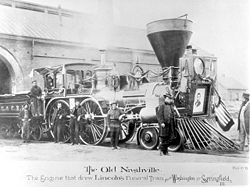
Lincoln'southward funeral train carried his remains, besides as 300 mourners and the catafalque of his son William, ane,654 miles to Illinois.
Booth was shot 12 days afterward while beingness captured. Four co-conspirators were convicted and hanged, while three others were given life sentences.
Lincoln's trunk was carried past train in a grand funeral procession on its style back to Illinois. The nation mourned a man whom many viewed equally the savior of the United States. He was buried in Springfield, where a 177-human foot (54 m) tall granite tomb surmounted with several bronze statues of Lincoln was synthetic by 1874. To prevent attempts to steal Lincoln's trunk and hold it for ransom, Robert Todd Lincoln had Lincoln exhumed and reinterred in concrete several feet thick on September 26, 1901.
Legacy and memorials
Lincoln'southward death made the president a martyr to many. Today he is perhaps America's second well-nigh famous and honey president subsequently George Washington. Repeated polls of historians have ranked Lincoln as among the greatest presidents. Among gimmicky admirers, Lincoln is usually seen as a figure who personifies classical values of honesty and integrity, also equally respect for individual and minority rights, and human freedom in general. Many American organizations of all purposes and agendas continue to cite his name and image, with interests ranging from the gay rights group Log Cabin Republicans to the insurance corporation Lincoln Financial Grouping.
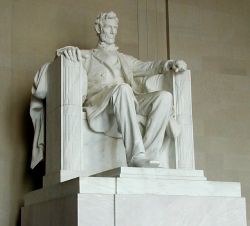
Daniel Chester French'due south seated Lincoln faces the National Mall to the east.
Over the years Lincoln has been memorialized in many ways: Lincoln, capital of Nebraska is named after him; the Lincoln Memorial in Washington, D.C. was congenital in his honor; the U.S. five dollar bill and the ane cent coin (Illinois is the primary opponent to the removal of the penny from circulation) both bear Lincoln's picture; and he is one of four presidents featured as part of the Mount Rushmore National Memorial. Lincoln's Tomb, Lincoln Home National Historic Site in Springfield, Illinois, New Salem, Illinois (a reconstruction of Lincoln's early adult hometown), Ford'southward Theater, and Petersen Business firm are all preserved as museums. The state nickname for Illinois is "Land of Lincoln."
Counties of the United States in 18 states: Arkansas, Colorado, Idaho, Kansas, Minnesota, Mississippi, Montana, Nebraska, Nevada, New Mexico, Oklahoma, Oregon, Southward Dakota, Tennessee, West Virginia, Washington, Wisconsin, and Wyoming are named Lincoln County after him.
On February 12, 1892, Abraham Lincoln'south birthday was declared to be a federal holiday, although in 1971 it was combined with Washington's birthday in the grade of President'south Day. February 12 is still observed as a dissever legal holiday in many states, including Illinois.
Lincoln'southward birthplace and family unit home are national historic memorials: Abraham Lincoln Birthplace National Historic Site in Hodgenville, Kentucky and Lincoln Home National Historic Site in Springfield, Illinois. The Abraham Lincoln Presidential Library and Museum is also in Springfield. The Abraham Lincoln National Cemetery is located in Elwood, Illinois.
Statues of Lincoln can be found in other countries. In Ciudad Juárez, Chihuahua, United mexican states, is a thirteen-pes high statuary statue, a gift from the U.s.a., dedicated in 1966 past President Lyndon B. Johnson. The U.S. received a statue of Benito Juárez in commutation, which is in Washington, D.C. Juárez and Lincoln exchanged friendly messages, and Mexico remembers Lincoln'southward opposition to the Mexican-American State of war. At that place is also a statue in Tijuana, Mexico, showing Lincoln standing and destroying the chains of slavery. In that location are at least three statues of Lincoln in the U.k.—one in London, 1 in Manchester and another in Edinburgh.
The aircraft carrier Abraham Lincoln (CVN-72) was named in his laurels. Likewise, the USS Nancy Hanks was named to accolade his mother.
In a recent public vote entitled "The Greatest American," Lincoln placed second.
Quotes
- "If I were to endeavor to read, much less answer, all the attacks fabricated on me, this shop might as well be closed for any other business organisation. I do the very best I know how—the very best I can; and I mean to keep doing so until the terminate. If the end brings me out all correct, what's said against me won't amount to annihilation. If the end brings me out incorrect, ten angels swearing I was right would make no deviation." -The Inner Life of Abraham Lincoln: Six Months at the White House, by Francis B. Carpenter (Academy of Nebraska Press, Lincoln, Nebraska, 1995), 258-259.
- "Let the states take faith that right makes might, and in that religion, let us, to the end, dare to do our duty as we understand it." -Lincoln'south Cooper Institute Address, February 27, 1860.
- "Those who deny liberty to others, deserve it non for themselves; and, under a only God, can not long retain it." - "Alphabetic character To Henry L. Pierce and Others", Apr 6, 1859.
- "…It is rather for us to be here dedicated to the great task remaining earlier us—that from these honored dead we accept increased devotion to that cause for which they gave the last total measure of devotion—that nosotros here highly resolve that these expressionless shall non have died in vain—that this nation, under God, shall accept a new nativity of liberty—and that government of the people, by the people, for the people, shall not perish from the earth." -"Gettysburg Accost," delivered November nineteen, 1864.
Presidential appointments
Cabinet
Lincoln was known for appointing his enemies and political rivals to loftier positions in his Cabinet. Not just did he use great political skill in reducing potential political opposition simply he felt he was appointing the best qualified person for the good of the state.
| OFFICE | NAME | TERM |
| President | Abraham Lincoln | 1861–1865 |
| Vice President | Hannibal Hamlin | 1861–1865 |
| Andrew Johnson | 1865 | |
| Secretarial assistant of State | William H. Seward | 1861–1865 |
| Secretary of the Treasury | Salmon P. Chase | 1861–1864 |
| William P. Fessenden | 1864–1865 | |
| Hugh McCulloch | 1865 | |
| Secretary of State of war | Simon Cameron | 1861–1862 |
| Edwin M. Stanton | 1862–1865 | |
| Attorney General | Edward Bates | 1861–1864 |
| James Speed | 1864–1865 | |
| Postmaster General | Horatio King | 1861 |
| Montgomery Blair | 1861–1864 | |
| William Dennison | 1864–1865 | |
| Secretary of the Navy | Gideon Welles | 1861–1865 |
| Secretary of the Interior | Caleb B. Smith | 1861–1863 |
| John P. Usher | 1863–1865 | |
Supreme Court
Lincoln appointed the following Justices to the Supreme Court of the United States:
- Noah Haynes Swayne – 1862
- Samuel Freeman Miller – 1862
- David Davis – 1862
- Stephen Johnson Field – 1863
- Salmon P. Chase – Master Justice – 1864
Major presidential acts
- Involvement equally President-elect
- Morrill Tariff of 1861
- Corwin Amendment
- Enacted as President
- Signed Revenue Act of 1861
- Signed Homestead Act
- Signed Morill Land-Grant Higher Human activity
- Signed Internal Revenue Deed of 1862
- Established Bureau of Agriculture (1862)
- Signed National Banking Act of 1863
- Signed Internal Revenue Deed of 1864
- Signed the Coinage Human activity of 1864, which placed the motto "In God We Trust" upon the one-cent and 2-cent coins
States admitted to the Matrimony
- West Virginia – June 20, 1863
- Nevada – October 31, 1864
See also
- American Civil War
- Abolitionism
Notes
- ↑ Marker A Noll, "The Ambiguous Faith of President Abraham Lincoln", The Religious Amalgamation of President Abraham Lincoln. Retrieved July 18, 2019.
- ↑ The Collected Works of Abraham Lincoln. The Abraham Lincoln Association. Retrieved July 18, 2019.
- ↑ Abraham Lincoln, "A House Divided Against Itself Cannot Stand" Springfield, Illinois, June 16, 1858. Retrieved July eighteen, 2019.
- ↑ Abraham Lincoln's Letter to Horace Greeley., August 22, 1862. Abraham Lincoln Online. Retrieved July xviii, 2019.
- ↑ The Emancipation Proclamation. National Archives. Retrieved July eighteen, 2019.
- ↑ The Abraham Lincoln Papers at the Library of Congress. Retrieved July 18, 2019.
References
ISBN links support NWE through referral fees
- Burlingame, Michael (ed.). An Oral History of Abraham Lincoln: John G. Nicolay'south Interviews and Essays. Southern Illinois University Press, 2006. ISBN 0809326841
- Carpenter, Francis B. The Inner Life of Abraham Lincoln: Six Months at the White House. Lincoln, NB: University of Nebraska Press, [1995] reprint ed. 2007 ISBN 0548107300.
- Charnwood, Lord. Abraham Lincoln, (original 1916), new ed. Lanham, Medico: Madison Books, 1998. ISBN 0486299597
- The Collected Works of Abraham Lincoln, edited by Roy P. Basler, 9 Volume set, Volume III, Rutgers Univ. Press, 1953.
- DiLorenzo, Thomas. The Real Lincoln: A New Expect at Abraham Lincoln, His Agenda, and an Unnecessary War. New York: Three Rivers Press (Random House), 2003. ISBN 0761526463
- Donald, David Herbert. Lincoln. New York: Simon & Schuster, 1999 ISBN 068482535X
- Donald, David Herbert. Lincoln Reconsidered: Essays on the Civil War Era, 3rd ed. New York: Vintage, [1961] 2001. ISBN 0375725326
- Goodwin, Doris Kearns. Team of Rivals: The Political Genius of Abraham Lincoln. New York: Simon & Schuster, 2005. ISBN 0684824906
- Guelzo, Allem C. Abraham Lincoln: Redeemer President. 1000 Rapids, MI: Wm. B. Eerdmans Publishing, 2003. ISBN 0802842933
- Hay, John, and John George Nicolay. Abraham Lincoln: A History. Volume 1 and Volume ii. Retrieved July 18, 2019.
- Holzer, Harold. Lincoln at Cooper Matrimony: The Voice communication That Made Abraham Lincoln President. New York: Simon & Schuster, 2004. ISBN 0743224663
- McPherson, James Grand. Abraham Lincoln and the 2d American Revolution, reprint ed. New York: Oxford Academy Printing, 1992. ISBN 0195076060
- Perret, Geoffrey. Lincoln'south State of war: The Untold Story of America's Greatest President every bit Commander-in-Principal. New York: Random House, 2004. ISBN 0375507388.
- Reilly, Philip. Abraham Lincoln'due south DNA and other adventures in genetics. Cold Leap Harbor, NY: Cold Spring Harbor Laboratory Press, 2000. ISBN 0879695803
- Shenk, Joshua Wolf. Lincoln's Melancholy: How Depression Challenged a President and Fueled His Greatness. New York: Houghton Mifflin, 2005. ISBN 0618551166
- Tripp, C. A. The Intimate World of Abraham Lincoln. New York: Free Press, 2005. ISBN 0743266390
- Willis, Garry. Lincoln at Gettysburg: The Words That Remade America, reprint ed. New York: Simon & Schuster, 1993. ISBN 0671867423
External links
All links retrieved April viii, 2021.
- The Lincoln Institute
- Abraham Lincoln Papers at the Library of Congress
- Poetry written by Abraham Lincoln
- Abraham Lincoln'south Plan of Black Resettlement
- Abraham Lincoln Online
- The Nerveless Works of Abraham Lincoln
- Abraham Lincoln Prints
- Lincoln Memorial, Washington, D.C.
- eText of The Boys' Life of Abraham Lincoln (1907) by Nicolay, Helen (1866 to 1954)
- eText of The Life of Abraham Lincoln (1901) by Henry Ketcham
- Book 1 and Volume 2 of Abraham Lincoln (1899) by John T. Morse
- eText of The Every-day Life of Abraham Lincoln (1913) by Francis Fisher Browne
- eText of Abraham Lincoln: The People's Leader in the Struggle for National Existence (1909) by George Haven Putnam
- eText of Lincoln's Personal Life (1922) by Nathaniel West. Stephenson
Credits
New World Encyclopedia writers and editors rewrote and completed the Wikipedia article in accordance with New Earth Encyclopedia standards. This commodity abides by terms of the Creative Commons CC-by-sa 3.0 License (CC-past-sa), which may exist used and disseminated with proper attribution. Credit is due nether the terms of this license that can reference both the New Earth Encyclopedia contributors and the selfless volunteer contributors of the Wikimedia Foundation. To cite this article click here for a list of acceptable citing formats.The history of earlier contributions by wikipedians is accessible to researchers here:
- Abraham_Lincoln history
The history of this commodity since it was imported to New World Encyclopedia:
- History of "Abraham Lincoln"
Note: Some restrictions may apply to use of individual images which are separately licensed.
Source: https://www.newworldencyclopedia.org/entry/Abraham_Lincoln
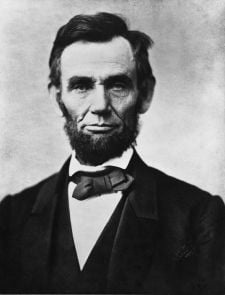
0 Response to "Elected President in 1884 and Again in 1892"
Postar um comentário